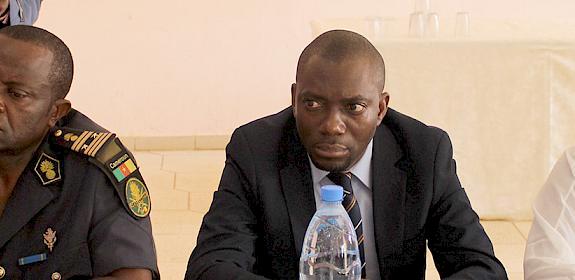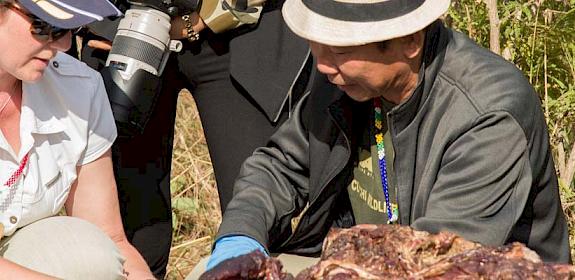New Tool Proves its Worth in West Africa Wildlife Trafficking Rescue
When a boat ran into trouble in Togolese waters and called for assistance, the recovery mission discovered that it was not only the lives of the crew at risk. An emerging West African anti-wildlife trafficking initiative had a chance to spread its wings.

On 9 February 2024, a distress call alerted the Togolese Navy to a crew of four caught in rough seas off the coast. The crew were brought safely into port, but it turned out they were not the only ones in distress at sea.
Upon inspection of the boat, the Togolese Navy discovered some far-flung passengers: 17 Golden Lion Tamarins and 12 Lear’s Macaws, threatened species native to the forests of Brazil. In an unexpected turn of events, the distress call had been sent out by wildlife traffickers amid a high-value smuggling operation.
Upon interrogation, the crew, already in possession of fraudulent CITES1 documentation, claimed the animals were from Guyana when, in fact, their origins were from Brazil.
Additionally, both species are classed as Endangered on the IUCN Red List of Threatened SpeciesTM - threatened by habitat loss as well as live capture for the exotic pet trade. Both are also listed on CITES Appendix I, making their international trade illegal.
Thanks to the efficient action of the Togolese authorities2, the animals were seized, and three of the crew and one ground contact were swiftly arrested. As of April 2024, one suspect is still at large.
Coincidentally, law enforcement authorities and non-governmental organization (NGO) partners from across West Africa were attending basic investigator training for the Wildlife Law Enforcement Task Force (WLETF).
This training workshop was part of preparations to launch a new information-sharing platform - known as TWIX (Trade in Wildlife Information eXchange) - to help law enforcement officers across West Africa disrupt illegal wildlife crime.
West Africa-TWIX is operated by TRAFFIC – global leaders advising on illegal wildlife trade – and developed under the USAID-funded WABiLED (West Africa Biodiversity and Low Emissions Development) program.

Word of the discovery of the macaws and monkeys aboard the ship spread rapidly.
Capitalising on the multi-disciplinary skills and expertise of the attendees at the workshop, the officer in charge of the Togolese seizure was immediately able to source advice and harness the power of the West Africa-TWIX network – even before its formal launch – to make connections across borders and facilitate the repatriation of the animals.
West Africa-TWIX has a major role to play in this seizure by alerting colleagues to look out for species trafficked from Latin America through West African coast, and also the coordination work between different agencies that facilitated the repatriation of these species back to Brazil."
Colonel Bakai, CITES interim focal point in TogoThe animals had been stowed in appalling conditions; three of the 20 tamarin monkeys had died during the journey. After initial rehabilitation, with the support of TWIX, Brazilian police were able to fly the surviving animals back home.
It is devastating to hear about endangered animals being taken from the wild and treated this way by criminal gangs. The value of TWIX, which already exists in Eastern Africa, Central Africa, SADC and Europe too, couldn’t be made any clearer by this event."
Maliki Wardjomto, Project Manager for West Africa-TWIX at TRAFFIC
TWIX consists of tools to help the effective enforcement of wildlife trade laws, including a seizure database, ID guides, and a mailing list of regional contacts. It has been launched in five countries – Côte d’Ivoire, Ghana, Liberia, Nigeria, and Togo. Even before its launch, the West Africa-TWIX network was receiving requests to expand further across the region, and it ultimately aimed to include all 15 countries in the Economic Community of West African States (ECOWAS).
Other TWIX platforms, operated by TRAFFIC, already operate in Europe, Central Africa, East Africa, the Southern African Development Community.
Notes:
1 Convention on International Trade of Endangered Species of Wild Fauna and Flora.
2 Authorities involved in the seizure included the Togolese Navy, the Togolese Maritime Brigade, and the Ministry of Environment and Forest Resources.
About USAID

The United States Agency for International Development (USAID) is responsible for the majority of overseas development assistance from the United States Government and works to end extreme poverty and promote resilient, democratic societies while advancing security and prosperity for America and the world. www.usaid.gov/





